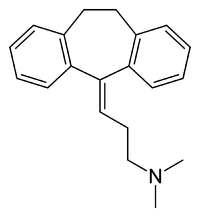Random Drug Spotlight: Amitriptyline
 I think we need more bells and whistles on this here blog; like those corny morning zoo radio shows have Phony Phone Call Mondays, Tell Off Your Boss Tuesdays and Wacky Wednesdays and ish like that. We need some more recurring fixtures.
I think we need more bells and whistles on this here blog; like those corny morning zoo radio shows have Phony Phone Call Mondays, Tell Off Your Boss Tuesdays and Wacky Wednesdays and ish like that. We need some more recurring fixtures.
In a former life I was a chemist. I had a bevvy of round-bottom flasks and ran a small-town apothecary just outside of Dundee, Scotland. My trusty scientist smock was always pristine snow white and impeccably starched by my wife, Heidi Gloomandsun.
In addition to pharmacy we also offered general medical advice and a range of other services such as surgery and midwifery. We also sold tobacco and patent medicines or over-the-counter remedies.
So, a new fixture of this blog is doing to be the Random Drug Spotlight. I'll pick a random drug from the hurricane that is my mind and I'll tell you about it; what it does; what it helps cure; the side effects and so on; I'll even provide you with the IUPAC nomenclature whenever possible.
Today we're going to take a look at:
Amitriptyline (or Amitryptyline) hydrochloride!!!
Sold as: Elavil, Tryptanol, Endep, Elatrol, Tryptizol, Trepiline or Laroxyl
Amitriptyline is tricyclic antidepressant drug {tricyclic refers to the drugs' molecular structure, which contains three rings of atoms}. It is a white, odorless but tastes like licorice - GROSS! It's a crystalline compound which is freely soluble in water; it is usually dispensed in tasteless tablet form.
Amitriptyline inhibits serotonin {i} and noradrenaline {ii} reuptake almost equally.
Amitriptyline is approved for the treatment of endogenous depression and involutional melancholia (depression of late life, which is no longer seen as a disease in its own right). It may also be used to treat nocturnal enuresis a/k/a bed wetting. It is mainly prescribed to the elderly and adolescents.
Many drugs have unapproved/Off-Label and other investigational uses; especially antidepressants as many are prescribed for their unapproved side effects.
Amitriptyline may be prescribed for other conditions such as insomnia, migraines, chronic pain, irritable bowel syndrome, neurological pain, and painful paresthesias related to multiple sclerosis and as a preventative (prophylaxis) for patients with frequent migraines.
It is also used in small doses to act as a painkiller and ease the effects of Carpal Tunnel Syndrome. Typically lower dosages are required for pain modification of 10 to 50 mg daily.
Common side effects of using amitriptyline are weight loss or gain, drowsiness, nervousness, and dizziness insomnia. Some rare side effects include tinnitus, hypotension, mania, psychosis, anticholinergic effects, heart block, arrhythmias, extrapyramidal symptoms, more depression, and hepatic toxicity.
So next time you're at the pub with your mates and the topic of amitriptyline comes up, you'll be frighteningly well versed.
****
{i}Serotonin is believed to play an important role in the regulation of anger, aggression, body temperature, mood, sleep, sexuality and appetite.
{ii}Noradrenaline is naturally released in the central nervous system where it helps control alertness and arousal. It is released when a host of physiological changes are activated by a stressful event. This is caused in part by activation of an area of the brain stem called the locus ceruleus. As a stress hormone, noradrenaline affects parts of the human brain where attention and responding actions are controlled. It underlies the fight-or-flight response, directly increasing heart rate, triggering the release of glucose from energy stores, and increasing skeletal muscle readiness. Got it ?


1 comment:
heidi gloomandsun
i should change my name.that one suits.
xo
Post a Comment